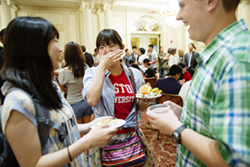DOS Resumes Scheduling Visa Interviews
According to media reports, the Department of State (DOS) resumed scheduling visa interview appointments on June 18th after a 3 week pause. During this time, DOS disseminated instructions to consular posts about how to review the social media presence of the visa applicant along with standard eligibility criteria when adjudicating applications for US entry visas.
A cable from the Secretary of State directs consular officers to screen both new and returning student visa applicants’ online presence for indications of hostility towards the citizens, culture, government, institutions or founding principles of the US. The cable instructs embassy officials to flag advocacy for, or support for foreign terrorists and other threats to U.S. national security as well as support for unlawful antisemitic harassment or violence and specifically lists support for the Hamas militant group as an example. The cable directs consular officers to flag applicants who demonstrate a history of political activism and directs them to consider the likelihood they would continue such activity in the United States.
After initially determining eligibility for the visa, consular officers are now required to refuse the case under INA 221 (g) to conduct additional screening. Each visa applicant will be instructed to set all social media accounts to “public” so the same consular officer can conduct the expanded social media screening. Applicants should keep in mind that a refusal based on 221 (g) signals that the applicant meets other visa eligibility criteria, but the consular officer needs more time and, in some cases, more information to approve the visa.
Consular officers have been instructed to make detailed case notes about their review of applicants’ online presences and to take screenshots to preserve the record against possible later alteration or loss of the information.” “Online presence” is defined as more than social media activity, and includes information in online databases, including LexisNexis. The cable says discovery of such online content should not automatically result in a visa denial but should trigger additional review so consular officers can determine whether an applicant will respect U.S. laws and “engage only in activities consistent with his nonimmigrant visa status.”
A Department of State press release provides justifications as to the need for expanded screening and suggests visa applicants should adjust account security settings to “public”. Visa applicants are reminded to fully disclose social media identifiers on the DS-160 visa application and be mindful of how images and posts on social media could be interpreted and considered during the visa application process.
It is unclear as to how different consular officers will apply these directives, but it is expected that this additional screening will delay visa application processing. ISSO will update the community as more details and guidance become available.


